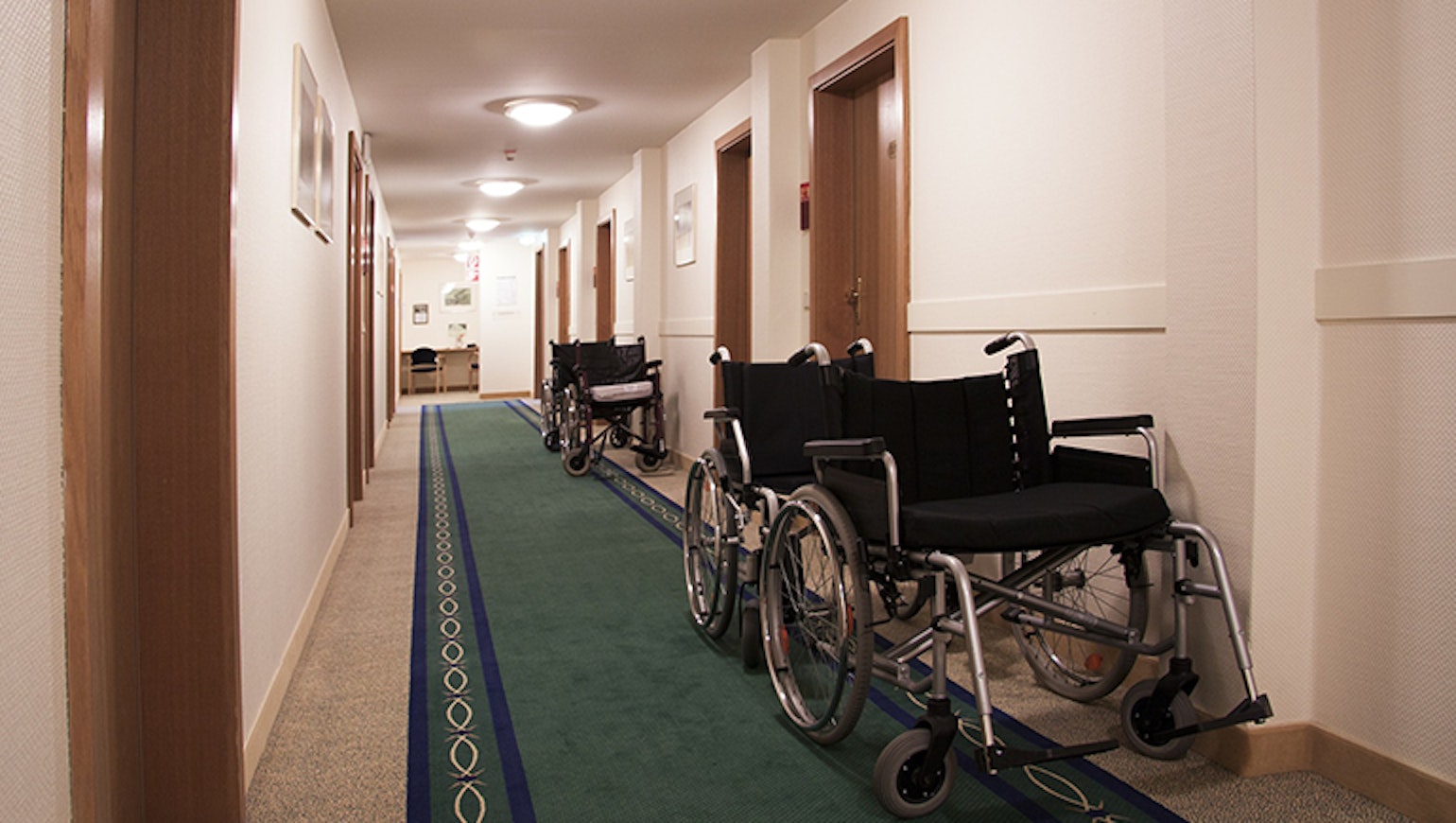Guide to setting up a care home
If you’re considering setting up a care home, there’s a lot to think about. In addition to registering the home with the relevant authorities, such as the Care Quality Commission (CQC), you’ll also need to consider your legal responsibilities and how to ensure your home is properly staffed.
13.05.25
By Alan Boswell Group

In this article
To give you a clearer idea of your obligations, we look at what setting up a care home entails and why care home insurance is an essential part of registration.
Initial considerations for opening a care home
As with any business, it’s important to consider its viability. If you’re applying for a business loan, your lender will expect to see a comprehensive business plan that supports your idea.
When it comes to care homes, you’ll need to explore:
Local demographics
If you want to open a care home for older people, check what demand there is locally.
Competition
Review local competition and ask yourself if there’s room for another provider. If you’re confident there is, think about what might make your home stand out.
Type of care provided
If you’re considering adult social care, be clear about the type of care you provide, for example, residential, respite, nursing or dementia care. You can provide different types of care, but think about whether space allows (for example, dementia care providers usually have separate units for people living with dementia).
Essential qualifications and skills
Care homes must be run by a registered manager who holds a level five diploma in health and social care. For deputy managers, this qualification is the next step in their careers and helps them develop the skills needed to manage a care home.
Senior carers are usually expected to hold a level three diploma in health and social care, while care workers should have a level two diploma. First-time carers are often supported by their employers and given study time outside of work to complete their level two, or can be offered apprenticeships for on-the-job training.
Navigating CQC registration
All care homes must be registered with the CQC as a ‘new provider’, and you’ll also need to register the ‘new manager’.
It’s free to apply, but you’ll need to pay an annual fee to keep your registration active. You’ll also need to provide details of where the home will be and the type of care that will be carried out (for example, nursing care).
Not registering your care home can lead to heavy fines and, in some cases, you can be imprisoned.
CQC fundamental standards
As part of the registration process, you’ll have to agree to meet the CQC’s care standards, known as the ‘fundamental standards’. These are the minimum levels of care residents should expect, and include:
Person-centred care – care must be tailored to each person, with their wishes taken into account.
Visiting and accompanying – care home residents should be able to go out without difficulty and can expect to be accompanied if they need to see a doctor or go to a hospital.
Dignity and respect – residents must be treated with dignity, respect and as an equal, including their privacy.
Consent – residents or their legal representatives must give consent for treatment.
Safety – residents must not be put at risk, and as the provider, you must carry out health and safety risk assessments.
Safeguarding from abuse – residents should not experience poor treatment that can be considered abusive, such as neglect or unnecessary restraint.
Food and drink – residents must receive food and drink to maintain good health (this includes modified diets for those who need it).
Premises and equipment – this must be clean, properly maintained, and fit for purpose.
Complaints – there should be clear processes for making, investigating, and managing complaints.
Good governance – there must be a clear system for ensuring quality of care.
Staffing – care homes need to be properly staffed so that employees can carry out effective care and support these fundamental standards.
Fit and proper staff – you’ll need to implement good recruitment practices to employ qualified and competent staff.
Duty of candour – the care provided must be transparent so that if something does go wrong, it is acknowledged and addressed.
Display of ratings – homes must show their CQC rating where it can be seen.
CQC inspections
The CQC regulates health and social care in England and inspects services to ensure they meet standards. Inspections are either comprehensive or focused.
Comprehensive inspections look at five key areas: safe, caring, effective, responsive, and well-led. Focused inspections are shorter and don’t always cover all five areas.
When the CQC visit your care home, they’ll observe the care provided and speak to residents, their families, and staff. They can also review any policies you have, care plans, resident risk assessments, and other records (such as winter contingency plans).
Using all this information, they’ll assemble a report of their findings and identify any steps you need to take to improve your service. The home will also be given a rating of ‘outstanding’, ‘good’, ‘requires improvement’, or ‘inadequate’.
Legal and regulatory requirements for care homes
All care homes must ensure they meet their legal obligations, which are set out in a number of different pieces of legislation, which include:
The Health and Social Care Act 2008 (Regulated Activities) Regulations 2014
This is the central set of regulations that you must meet and includes the fundamental standards.
The Care Quality Commission (Registration) Regulations 2009
These regulations set out the need to register your care home and what you must do if there are any changes to this.
This provides guidance about how to support residents who may not be able to make decisions themselves.
This document provides safeguarding guidelines, ensuring that there are policies and procedures in place to keep vulnerable adults safe and how to identify and manage concerns.
Food Safety and Hygiene Regulations (England) 2013
This provides clear food health and safety regulations in England, giving local authorities the power to ensure food safety.
This sets out how people’s personal information can be used and processed. It describes the rights of individuals whose data you hold and your responsibilities for keeping it safe and secure.
This act governs employment rights in the UK, including the right for employees to have a clear contract and the rules around time off, dismissal, and redundancy.
Developing essential policies and procedures
Your legal and regulatory responsibilities will need to be interpreted into day-to-day practices, which should be set out in policies. Within each policy, there should be a clear process that identifies concerns and the steps you’ll take to resolve or manage these issues.
Policies to consider drafting include:
Safeguarding
Medication management
Complaints
Health and safety for residents and staff
Staffing your care home
Your care home needs to have enough staff to ensure you meet all your legal obligations. You also need to put in place clear recruitment policies to make sure potential employees undergo all the necessary checks and have the correct qualifications.
It’s also your responsibility to ensure staff have the tools and training to do their jobs. Apprentices or newly employed staff should also be properly supervised (a comprehensive induction process can help here).
Regular appraisals should be in place too, so that employees have clear guidance and feedback on how to improve performance.
The importance of care home insurance
Care home insurance isn’t just about cushioning financial risks; you’ll need to show the CQC that you have suitable insurance. The CQC can provide you with a list of the minimum insurance features you’ll need, but policies should be tailored to cover your specific activities.
Features to consider as part of your care home insurance package include:
Buildings, contents, and residents’ property – provides compensation for insured events (for example, fire, flood, theft, vandalism).
Employers’ liability – you must have this by law if you employ anyone, even on a part-time basis.
Public liability – this covers costs if a third-party blames your business for injury or damage (for example, if a resident’s relative tripped and fell while visiting).
Medical malpractice – covers costs if your home is accused of medical negligence.
Loss of registration – if you risk losing your CQC registration but have justification to challenge, this will pay for your defence (there may be a limit to what you can claim).
Business interruption – if your care home has to close due to an insured event, this covers your loss of income and pays any additional expenses related to the closure.
Fleet insurance – vehicle insurance for any cars or minibuses owned by the business.
Fidelity cover – covers misdemeanours carried out by employees (for example, stealing).
Abuse cover – this is typically a ringfenced amount under your public liability policy. For example, your public liability cover might be up to £5 million, but abuse cover may only be up to £1 million.
Mitigating financial risk with care home insurance
Providing care services is considered a regulated activity, which means you must follow strict legal and regulatory rules; if not, you can be fined and imprisoned.
Nearly half a million people live in care homes, but the UK’s ageing population means an additional 144,000 beds will be needed over the next ten years to meet demand. But, setting up a care home still needs careful business planning and involves key steps:
Understanding local demographics and potential demand
Registering as a new provider with the CQC
Finding qualified employees
Meeting the fundamental standards of care and setting out policies to support this
With so much to consider, it’s easy to forget the role business insurance can play in helping support your business. Not only can care home insurance compensate you for property, contents, and equipment damage, but a comprehensive policy can also help minimise other financial risks, such as business interruption.
The fine lines between different liability covers (for example, professional liability versus medical malpractice) also means care home insurance is a complex and specialist policy.
Need help with your insurance?
At Alan Boswell Group, we can help tailor your care home insurance policy so it reflects the activities you carry out, ensuring that all aspects of your business are covered. For more information or to discuss your requirements, you can speak to one of our experts on 01603 218000.
We also offer other types of care and medical insurance, so if you’re considering alternative care services, such as domiciliary care please get in touch.
Make an enquiry
Care homes for older people must be run by a registered manager who holds a level five diploma in health and social care. Senior carers are usually expected to hold a level three diploma in health and social care, while care workers should have a level two diploma.
You can also offer apprenticeships and provide study time for new carers.
Registration can take a few months as the CQC must thoroughly check your application and supporting documents.
These are the minimum standards that all healthcare providers must meet. Provision must not fall below these expectations. They are:
Person-centred care
Visiting and accompanying
Dignity and respect
Consent
Safety
Safeguarding from abuse
Food and
Premises and equipment
Complaints
Good governance
Fit and proper staff
Duty of candour
Display of ratings
Related guides and insights

Comprehensive guide to care home insurance: protecting your business
If you own or manage a care home, ensure you have all your insurance liabilities covered with our comprehensive guide.

Managing resident safety risks in care homes
Care home insurance can help mitigate the financial impact of accidents and mistakes, but avoiding unnecessary risks in the first place should be a priority. We look at how to manage resident safety and implement effective risk assessments.

The difference between domiciliary and residential care
Domiciliary and residential care share similarities, but if you’re thinking about setting up a domiciliary care business or weighing up care options for a loved one, what are the differences and advantages of each?

Winter contingency plans for care homes
To manage risk in your care home, we look at what to consider when it comes to setting out effective winter contingency plans, and how care home insurance can help cover the cost if the unexpected does happen.
